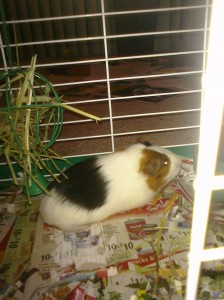On Electives and Grad School in General
February 26th, 2010 by Colleen Hughes '04It’s scary, but I’m already thinking about what electives to take this summer since registration begins in March. After early May, I will be finished with the four playwriting workshops that make up the most important part of the degree, and all I’ll have left are my electives. We need to take four of them, but I’ll be transferring in a graduate English course I took at UMass Amherst last year (I am now mentally adding “go to the Graduate Studies office to pick up a course transfer request form” to my to-do list). If I can get the three remaining electives completed during the summer session, I could be done in time for September graduation. I know that I definitely want to take a dramatic literature class called Pulitzer Prize-Winning Plays in the first summer session. The other two options in that session are Literature of the Middle Ages and African-American Literature, so I’d have to pick one of those as well. I think the only class in the second summer session that we can take is called Linguistics in Literature. I haven’t made any definite decisions beyond the Pulitzer class though because I’ve heard that another theater professor is supposedly going to teach a class that just hasn’t been posted yet, and I’ll want to take her class if it does end up being offered because I hear that she’s great.
All this planning over electives has been causing me to think about a lot of the differences I’ve perceived in undergrad vs. graduate classes. I got to see my HC roommate Jen again this past weekend, and we were talking about this because she has her MA in Political Science and had noticed a lot of the same trends I had in just my one UMass English course. We both sort of went into grad school expecting the classes to become even more specialized. For an undergrad English major, for example, a lot of the core classes are things like “Readings in 20th Century American Literature” and other broad survey courses. Then the upper-level courses and seminars are where things get more specialized, like the ones I took on just Emily Dickinson and on Shakespeare’s Tragedies. I was expecting graduate classes to be more like those seminars, really focused on one topic that you would study in depth, and Jen had been expecting the same thing from poli. sci.
To our surprise though, the typical grad school courses we’ve encountered have been very much like broad survey courses. My class I took at UMass was on 16th Century Lit, and the BU summer courses sound similarly broad in scope. It seems like once you’re in grad school, the point is to give you a strong foundation in a wide topic and then allow you to dig deeper into one particular area of that topic for your own personal research. It sort of lets you personalize the class to some extent and expects more independent work and study from you. In 16th Century Lit, for example, we read multiple texts every week, and then I did my presentation and paper on Spenser’s The Faerie Queene, going deeper and beyond what we had discussed in class.
Graduate courses also almost always seem to include an in-class presentation as part of the grade too, I’ve noticed… which makes sense as a way to help prepare PhD students for future conferences and teaching jobs. My Tuesday workshop this semester includes a presentation as part of our requirements. Mine is scheduled in April and will be on Irish playwright Samuel Beckett. I read his Waiting for Godot and Endgame in Ed Isser’s Modern Drama class at HC and loved them both, so I’m actually looking forward to my presentation.
I think Holy Cross definitely left me well prepared for the different types of work encountered in grad school. I know I was very much prepared as far as the workload is concerned (I’m thinking back to long days huddled in Dinand, Rehm, or even the science library and long nights in front of my computer writing papers), and the classes I took at HC also helped me realize where my passions lie so that I’m able to explore them independently in my graduate classes. I knew right away that I wanted to do my playwright presentation on Beckett because I’d learned at HC that I love his style (I will admit though, that I knew from undergrad experience that I was not a fan at all of The Faerie Queene, but since I joined that course during add/drop, all the presentation topics on works I liked such as Dr. Faustus had been claimed already). It is definitely a confidence booster to know that even when I finish the playwriting workshops and have to move back into the intimidating realm of academic writing, I do have a really strong foundation and am more than prepared to handle the work.



